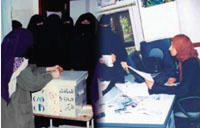
Can a women’s shadow Parliament succeed? [Archives:2007/1107/Reportage]
November 29 2007
 |
In 1993, 42 women ran in Yemen's parliamentary elections, but only two won seats. Eleven women ran in 2003, but only Oras Sultan Naji of the General People's Congress, Yemen's ruling party, won.
For this reason, human rights activist Jamal Al-Shami presented the idea of a women's shadow Parliament earlier this year. He explains, “Since Yemen has always supported women and their rights – including their participation in elections – a shadow Parliament would be a place for women to fully understand their rights and obligations.”
Al-Shami, who chairs the Democracy School, which is an NGO, says the shadow Parliament targets those women who already have run in local and parliamentary elections and now wish to run in the upcoming elections. “The main purpose of this Parliament is to prepare and strengthen them for the 2009 parliamentary and local elections,” he explains.
According to him, the shadow Parliament will be a great opportunity for Yemeni women to participate in the political arena and become more active in that regard.
Because it hasn't been funded yet, such a body remains in the works; however, Al-Shami indicates that the Democracy School has received affirmation from various organizations. “I've received numerous approvals from different organizations willing to support the idea. I believe this shadow Parliament will begin operating in January,” he notes.
However, Sana'a University political science professor Mohammed Al-Mutawakil believes the idea of a women's shadow Parliament is wrong because he says it leads to separating men and women. “Having a Parliament run by women is simply a way of saying that they are not equal to men,” he maintains.
“Parliament should be equal, where men and women both are involved and work as one body and one team. Parliament is based on equality, but this so-called 'shadow Parliament' is promoting gender discrimination.”
He adds, “If women need to be prepared for the upcoming elections, then they should be trained via workshops and seminars.”
Amel Al-Basha, chairwoman of Arab Sisters Forum, a local NGO, says the idea of a women's shadow Parliament was established at her organization's planning. “This idea actually has been in our organization's plans for years, but the Democracy School took it as a priority and began initiating it. Supporting this idea is an obligation for all of us in order to help women be an active part in politics,” she explains.
Rawofa Hasan, a professor at Sana'a University's Media Faculty maintains, “The idea isn't as bad as people think. I believe that any action toward applying true democracy and understanding it is good.”
She continues, “A lot is going on in this country, but too few actually are achieving something. The best thing for this Parliament is to organize it and understand its true purpose.”
Hasan adds, “Despite the different views and opinions, women should try to do whatever they can to understand what to do and how to stand up for their rights and how to establish their place in politics.”
The women's shadow Parliament will be comprised of 162 seats; however, because there's no building designated for it, meetings will be held at the Yemeni Parliament premises.
According to Al-Shami, the women will hold their first meeting once he receives financial support for the shadow Parliament. Further, they will receive training and participate in development programs.
“Training will include how to lead their electoral campaigns, as well as help them fully understand election policies,” Al-Shami notes.
According to him, the women's shadow Parliament will meet only every three months to discuss their training and progress.
——
[archive-e:1107-v:15-y:2007-d:2007-11-29-p:report]


